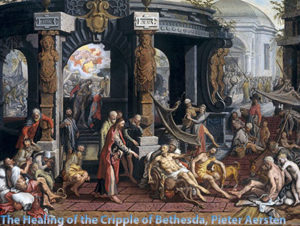For it is impossible, in the case of those who have once been enlightened, who have tasted the heavenly gift, and have shared in the Holy Spirit, and have tasted the goodness of the word of God and the powers of the age to come, and then have fallen away, to restore them again to repentance, since they are crucifying once again the Son of God to their own harm and holding him up to contempt. For land that has drunk the rain that often falls on it, and produces a crop useful to those for whose sake it is cultivated, receives a blessing from God. But if it bears thorns and thistles, it is worthless and near to being cursed, and its end is to be burned. –Hebrews 6:4-8
It’s probably not news to anyone that this passage has brought about a variety of interpretations. Some have been fanciful, others implausible, and many have not withstood serious scrutiny. Why all the hoopla? I think it’s because this passage puts our most fundamental understanding about salvation to the test. It looks like there are some people have had salvation and lost it. Not only that, but it seems to guarantee that should they want to repent, restoration remains impossible.
I’m convinced the difficulties and confusion comes from not understanding the covenantal nature of salvation. While broader American Evangelicalism thinks in terms of “saved” and “unsaved,” the bible doesn’t think that way. Sure, you can pull out a few verses from the Newer Testament to make it look like it does, but overall (which is Genesis-Revelation) the Bible thinks in terms of covenant: external and internal. A person may be (1) unconnected to the covenant, (2) externally and internally connected, or (3) externally but not internally connected to the covenant. Adding to the difficulty here, the NT doesn’t explicitly say much about being externally connected but not internally connected. That is, it speaks the same way of 2 and 3 above. The way you know if a person is one or the other is if that person perseveres and overcomes to the end.
In the passage above, we see that there are some people who are externally connected (they are baptized, been enlightened, tasted the heavenly gift, shared in the Holy Spirit, and tasted the goodness of the word of God and the powers of the age to come). That’s a lot, but that’s what you are supposed to get in being part of the church. They weren’t internally connected, however. They fell away. The Apostle Paul shines light on this kind of person in Romans 2 when speaking on a slightly different subject: For no one is a Jew who is merely one outwardly, nor is circumcision outward and physical. But a Jew is one inwardly, and circumcision is a matter of the heart, by the Spirit, not by the letter.
So rather than read these verses in Hebrews and freak out about someone losing their salvation, we should read them and realize that not everyone who is externally connected to the covenant is the real deal. They may really, really look like it for a long time, but the proof is in the fruit of their life. For land that has drunk the rain that often falls on it, and produces a crop useful to those for whose sake it is cultivated, receives a blessing from God. But if it bears thorns and thistles, it is worthless and near to being cursed, and its end is to be burned.
Hebrews was written to motivate those Hebrew Christians under persecution in Rome to hold fast and not fall away. The writer doesn’t unpack the wider theological questions here of apostasy. He simply tells us that it happens and urges us not to be a part of it. We need to leave it there because he did. We should also remember that many “drink the rain” and “produce a crop,” thus they receive a blessing from God. That’s for the followers of Christ all the way to the end, even if it is a bitter end. And that’s the gospel.
Come hear it preached and enacted in the Supper this Sunday!
